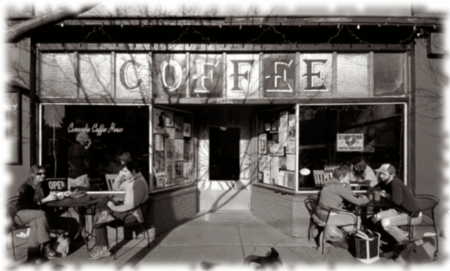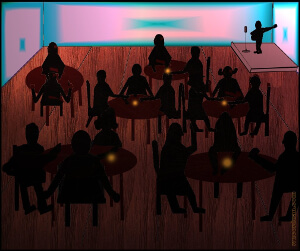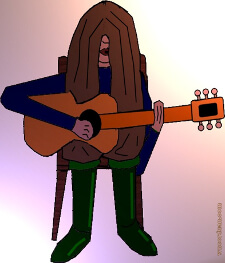“Member Blog Series” guest post submitted by StreetJelly artist: Win Corduan
Coffee Houses of the 60s and 70s: A Nostalgic Reminiscence
Come along with me, if you would, into this dimly lit store-front retreat. It’s dark outside, and your eyes have been waging a constant battle against the rapid-fire guns called “headlights” and the glaring assault weapons known as “fluorescent signs.” As you step inside, candles on makeshift tables and a few low-wattage lightbulbs provide sparse, but soft and friendly, illumination. From time to time people light their cigarettes, and the small flares given off by their matches punctuate the scene. The clouds of tobacco smoke do not mask the scent of freshly made popcorn. But you ask yourself whether you really are smelling any coffee, or if your imagination is merely calling up a familiar aroma created by an expectation. You are, after all, in a coffee house, sometime in the late 60s or early 70s.
 You hear music, coming from the little stage in the center of the side wall, where at various intervals aspiring folk singers are doing their best to entice the audience to listen to them. They are competing with the voices of people in conversation around the tables. The combined sounds intertwine and fill the room with a sense of shared humanity.
You hear music, coming from the little stage in the center of the side wall, where at various intervals aspiring folk singers are doing their best to entice the audience to listen to them. They are competing with the voices of people in conversation around the tables. The combined sounds intertwine and fill the room with a sense of shared humanity.
Coffee houses were not cafés, and they weren’t all that much about coffee. They were about people taking time to talk, face to face, over mugs of coffee and little bowls of popcorn or peanuts, opening up their thought worlds to each other. They were about music that joined the conversation if it spoke to the people or dropped into the background if it did not. A well-managed coffee house would constitute a welcoming space that brought together people whose paths would be unlikely to cross otherwise.

Original artwork by Win
I used to sing in various coffee houses over the years, but there were three of them with which I had a lengthier relationship: “The Pilgrim’s Cave,” in Washington, D.C., “Rahab’s” in Chicago, and “The Natural High” in Kenosha, Wisconsin, which I managed for a while. Performing was fun, and so was trading new chords, strums, and songs with others. Many scraps of paper, covered with words and chord symbols, changed hands. These places all had “regular crowds,” to borrow Billy Joel’s term, and my memories are bonded with the images of those people.
“The Pilgrim’s Cave” was located in the basement of a huge church. It must have been in 1966 that my older brother and I became regular performers there on Saturday nights. The man who ran it was a taxi driver by trade and a caring, loving person by heart. The stage was nothing more than the front of the room. Coffee or tea could be obtained at a small table on the side, with the understanding that you would put a coin or two into the little bowl if you had any. My strongest and fondest memory of the people there is of a young blind couple in their mid-twenties or so. For some reason, of all the songs they sang, the one that I remember is “The Sloop John B.” Sometimes they would call on the audience to sing along, and the girl would threaten, with a smile of course, “If you don’t participate, you’re going to get instant coffee.” When they weren’t singing, they would sit at a table and write each other notes in braille. It took them just one night to recognize some of us by our voices from then on.
“Rahab’s” in Chicago had a volunteer staff of seminarians and college students. The regular crowd included a number of recovering alcoholics for whom it was a safe haven on Friday and Saturday nights. I spent many an hour chatting with Wes, an out-of-work postal worker, who was familiar with the intricate philosophy of Alfred North Whitehead. Most of the time the mike was “open,” and I remember singing songs there that subsequently got buried and did not get resurrected until the coming of StreetJelly.

Original artwork by Win
Young men for whom their guitars were the only constant factors in their lives would drop by to do some sets. “Brother John,” who was neither the brother of anyone we knew nor in holy orders, amazed us all by his rendition of Suite Judy Blue Eyes. One of my favorite performers would introduce himself as “Rocket, the Flying Squirrel,” and his guitar, “George.” He had long hair, almost down to his hips. When he was sitting on a chair and singing, his hair would fall forward, and all that one could see was a cone of hair, the guitar, and his incredibly tall boots, one of which he would pass around for tips after a few numbers. The room would go silent as he gripped your heart with his songs. “Down, down, down—into the depths of darkness.” I still remember the chord progression he played.
One night the music was provided by two young, but seasoned, folk artists. I can still see them in my mind’s eye, sitting on the stage, which in this building was situated right up to the painted-over store front window. They started their set with an upbeat number and followed up with something slow and lyrical. Suddenly there was an explosive sound coming from the street. A little hole appeared in the glass and, quite a distance into the room, in the ceiling. Someone outside, for reasons we’ll never know, had shot a small caliber weapon upwards through the window. Our performers did not miss a beat, but continued as though nothing had happened. When their song was finished, one of them remarked, “That’s the first time anyone has ever shot at us—from backstage.”
“The Natural High” was located close to Kenosha’s harbor and not too far away from Great Lakes Naval Base, but the sailors on leave were, for the most part, looking for something other than chatting with someone over coffee. So, once again, the regular crowd was made up of local folks. In contrast to the previous two places, this one was geared more toward younger people of high school and college age. Among them I vividly recall Holly, officially considered on staff, but often in need of help herself when she suffered flashbacks from her earlier days on LSD. Slightly older adults also showed up regularly, most of them good people who were subsisting on the margins of society and found cheer in the presence of energetic young people and their songs. (I was twenty-two by that time, married to June for a few months, and in my second year of graduate school.)
One of the regulars was a man named Pat, probably in his late thirties, who was out of work with few prospects. Whenever I was singing, he would call out, “Hey, Win! Do ‘House of the Rising Sun’!” Somehow that song had a special meaning for him, and I was happy to oblige. One night he came in beaming, wearing a new set of official-looking clothes. “My ship has come in, Win.” He had garnered a job. Pat continued to be a steady patron, and from then on he always proudly wore the uniform of an animal control officer.
As manager, I could insert a musical set of mine whenever I wanted to, but was always happy to give way to some new talent or one of the regular contributors. Artists who took themselves too seriously, sometimes commanding as much as $20.00 for their services, were likely to leave disappointed because people had not come to the coffee house to admire their talent. On the other hand, when Jeff, a regular performer, started his favorite Mason Proffit song, the chatter would die down, and by the time he got to the refrain, everyone would join in for seemingly never-ending repetitions: “Two hangmen hanging from a tree — that don’t bother me — at all. “
Memories are tenacious, and they get sweeter with time. But I must remind myself: “You can’t go back to Kansas.”
Win Corduan
